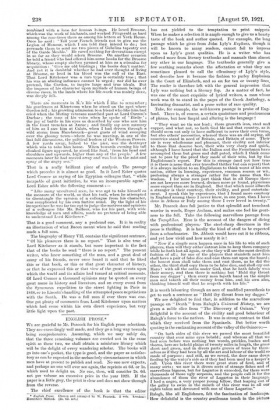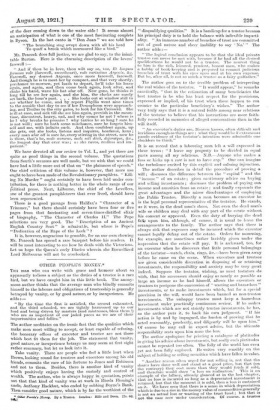ENGLISH PROSE.*
WE are grateful to Mr. Peacock for his English prose selections. They are exceedingly well made, and they go a long way towards being comprehensive. Assuming, which we may safely do, that the three remaining volumes are carried out in the same spirit as these two, we shall obtain a miniature library which will be the delight of every wandering scholar. The books will go into one's pocket, the type is good, and the paper as satisfac- tory as can be expected in the melancholy circumstances in which men have at present to publish and read. No one now expects, and perhaps no one will ever see again, the reprints at 6d. or ls. which used to delight us. No one, then, will consider 2s. 6d. net per volume an excessive price in the year 1921. If the paper is a little grey, the print is clear and does not show through from the reverse.
The chief excellence of the book is that the editor
• English Prose. Chosen and arranged by W. Peacock. 2 vain. Landon: Humphrey Milford. Its. 6d. net.)
has not yielded to the temptation to print snippets When he makes a selection it is ample enough to give us a hearty taste of the book and author quoted. For example, the long passage which he gives from John Lyly's Euphues, though it will be known to many readers, cannot fail to impress upon us Lyly's great qualities. He is a writer who has suffered more from literary textbooks and manuals than almost any other in our language. The textbooks generally give a. few scathing remarks about the affectation or what they are sometimes pleased to call the effeminacy of Lyly's style, and describe how it became the fashion to parley Euphuism in the Court of Elisabeth, and so on for ten or twenty lines, The reader is therefore left with the general impression that Lyly was nothing but a literary fop. As a matter of fact, he was one of the most exquisite of lyrical writers, a man whose work was fit to stand in the pages of the Greek Anthology, a fascinating dramatist, and a prose writer of rare quality.
Take, for example, the well-known passage in praise of Eng- land. There is, of course, a certain quaintness and preciousness of phrase, but how limpid and alluring is the language !
" They want no tin nor lead ; there groweth iron, steel and copper, and what not, so hath God blessed that country, as it should seem not only to have sufficient to serve their own turns, but also others' necessities, whereof there was an old saying, all countries stand in need of Britain, and Britain of none. Their air is very wholesome and pleasant, their civility not inferior to those that deserve best, their wits very sharp and quick, although I have heard that the Italian and the Frenchman have accompted them but gross and dull pated, which I think came not to pass by the proof they made of their wits, but by the Englishman's report. For this is strange (and yet how true it is there is none that ever travelled thither but can report) that it is always incident to an Englishman to think worst of his own nation, either in learning, experience, common reason or wit, preferring always a stranger rather for the name than the wisdom. I for mine own part think that in all Europe there are not lawyers more learned, divines more pr found, physicians more expert than are in England. But that which most allureth a stranger is their courtesy, their civility, and good entertain- ment. I speak this by experience, that I found more courtesy in England among those I never know, in one year, than I have done in Athens or Italy among those I ever loved in twenty."
Mr. Peacock does full justice to that splendid and trenchant warrior in words, Roger Ascham, and makes one feel his great- ness to the full. Take the following marvellous passage from the Toxophilus. Here is the account of the dangers of dicing with professional players: The steel-sharp directness in the prose is thrilling. It is hardly the kind of stuff to be expected from a schoolmaster. Dr. Abbott would have cut it to ribbons, and yet how vivid and how manly it is !
" Now if a simple man happen once in his life to win of such players, then will they either entreat him to keep them company while ho hath lost all again, or else they will use the most devilish fashion of all ; for one of the players that standeth next him shall have a pair of false dice and east them out upon the board ; the honest man shall take them and cast them, as he did the other, the third shall espy them to be false dice, and shall cry out Haro ! with all the oaths under God, that he hath falsely won their money, and then there is nothing but ' Hold thy throat from my dagger' ; then every man layeth hand on the simple man and taketh all their money from him, and his own also, thinking himself well that he scapeth with his life."
It is worth labouring through an acre of muddled parenthesis to get to such a sentence as " Hold thy throat from my dagger."
We are delighted to find that, in addition to the marvellous passage on " Death " from Ralegh's Universal History, we are given a noble slice from " The Discovery of Guiana." Very delightful is the account of the civility and good behaviour of Ralegh's force to the natives. It was in strong contrast to that which they received from the Spaniards. But better worth quoting is the enchanting account of the valley of the Orinoco:-
" On both sides of this river we passed the most beautiful country that ever mine eyes beheld ; and whereas all that we had aeon before was nothing but woods, prickles, bushes and thorns, here .we beheld plains of twenty miles in length, the grass short and green, and in divers parts groves of trees by them- selves as if they had been by all the art and labour of the world so made of purpose ; and still, as we rowed, the deer came down feeding by the water's side as if they had been used to a keeper's call. Upon this river there were great store of fowl, and of many sorts ; we saw in it divers sorts of strange fishes and of marvellous bigness, but for Lagartos it exceeded, for there were thousands of those ugly serpents, and the people call it for the abundance of them the river of Lagartos in their language. I had a negro, a very proper young fellow, that leaping out of the galley to swim in the mouth of this river was in all our sights taken and devoured with one of those Lagartos."
Ralegh, like all Englishmen, felt the fascination of landscape. How delightful is the country gentleman touch in the picture of the deer coming down to the water side ! It seems almost an anticipation of what is one of the most fascinating couplets in Byron. In the last canto in " Don Juan " wo are told how
" The branching stag swept down with all his herd To quaff a brook which murmured like a bird."
Mr. Peacock does full justice, we are glad to say, to the inimi- table Burton. Here is the charming description of the lovers' farewell :— And if thou be in love, thou wilt say so, too, Et longum Formosa vale (farewell, sweetheart), vale carissima Argenis, Farewell, my dearest Argenis, once more farewell, farewell. And though he is to meet her by compact, and that very shortly, perchance to-morrow, yet loath to depart, he'll take his leave again, and again, and then come back again, look after, and shake his hand, wave his hat afar off. Now gone, he thinks it long till he see her again, and she him, the clocks are surely set back, the hour's past. . . . She looks out at window still to see whether he come, and by report Phyllis went nine times to the seaside that day to see if her Demophoon wore approach- ing, and Troilus to the city gates, to look for his Creisseid. Sho is ill at ease, and sick till she see him again, peevish in the mean- time, discontent, heavy, sad, and why comes he not where is he ? why breaks he promise ? why tarries he so long ? sure he is not well ; sure he hath some mischance, sure he forgets him- self and me, with infinite such. And then confident again, up she gets, out she looks, listens and inquires, hearkens, kens ; every man afar off is sure he, every stirring in the street, now he is there, that's he, male aurorae, male soli dicit, dejeratque, &c., the longest day that over was ; sho raves, restless and im- patient."
We have devoted all our review to Vol. I., and yet there are quite as good things in the second volume. The quotations from South's sermons are well made, but we wish that we could have had a little more out of that on " the plainness of speech."
Our chief criticism of this volume is, however, that more use ought to have been made of the Revolutionary pamphlets. " Kill- ing No Murder " ought certainly to have been laid under con- tribution, for there is nothing better in the whole range of our political prose. Next, Lilburne, the chief of the Levellers, one of the greatest pamphleteers that ever lived, should have been represented.
There is a good passage from Halifax's " Character of a Trimmer," but there should certainly have been four or five pages from that fascinating and seven-times-distilled elixir of biography, " The Character of Charles II." The Pope selections are very good. The " Description of an Ancient English Country Seat " is admirable, but where is Pope's "Dedication of the Rape of the Lock " It is, however, ungracious to grumble, for on our own showing
Mr. Peacock has spread a rare banquet before his readers. It will be most interesting to see how he deals with the Victorians.
Let us hope the Queen's early Diaries wherein she Boswellized Lord Melbourne will not be overlooked.



































 Previous page
Previous page